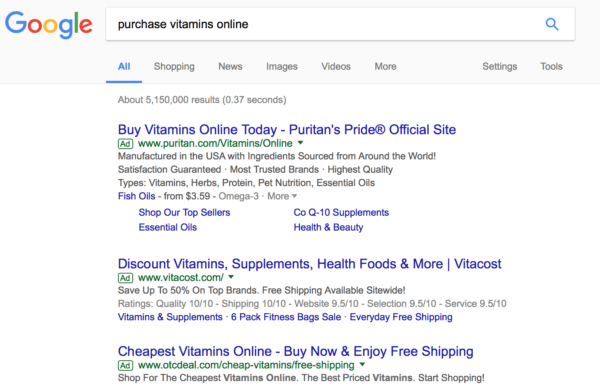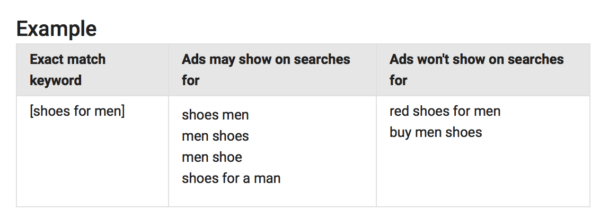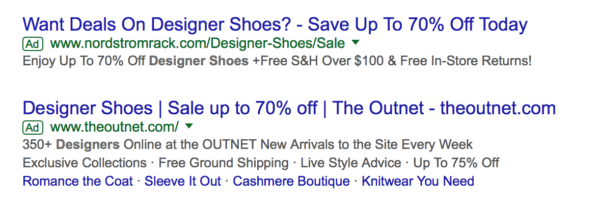Everything You Need to Know About Exact Match Keywords
by Jacob Baadsgaard • January 19, 2018
For paid search advertisers, choosing the right keywords can be the difference between a profitable campaign and the advertising equivalent of flushing money down the toilet. However, it’s not enough just to pick the right keywords—you also need to pick the right match type.
In this post, we’re going to take a close look at exact match keywords, what they are and when and how to use them for best results.
What are Exact Match Keywords?
Paid search ads are all about keywords. The keywords you choose will determine which searches your ads will show up and who sees your ads. You can enter in the keywords for the searches that you want your ads to be displayed on.
There are several different types of keyword match types, however. These let you determine how specific you want to be about your ad placements. Broad match, for example, gives you a little more flexibility and may help you show up in more ads, as it will show your ads to people who enter similar keywords into the search boxes.

Exact match, on the other hand, will only show your ads to users who actually type those exact keywords into the search bar. It doesn’t matter if another keyword that’s really close gets entered into that search bar, they have to use the exact keywords you’re targeting. In the example above, the exact match keyword could have been “vitamins online,” which is a high-intent keyword.
Exactly How Exact is Exact?
Originally, Google AdWords took the exact match option very literally. If you typed in “women’s running shoes,” your ads would only be shown to customers who typed in that exact phrase, with those words in that order only.
Last year, Google updated the algorithm so that semantically-identical phrases and keywords can still be used for ad placement under the exact match system. So now, if you choose the exact match keyword for “women’s running shoes,” you could still appear in matches like “running shoes for women” or “running shoes women’s.”

If the words are just re-ordered and still mean the same thing, you’ll be good to go. This might cause some problems if your product is associated with an incredibly specific phrase, but generally speaking, this change helps advertisers who are using exact match keywords get in front of a slightly larger, but still very targeted audience.
When Should I Use Google Adwords Exact Match?
Exact match allows you to get really, really specific. This means, for starters, that you’re only bidding on—and thus, spending money on—exact words and phrases that you believe will be beneficial to you.
In many cases, utilizing exact match keywords can increase the likelihood that your ad will be relevant to your target audience. You can use this to your advantage to create highly-targeted ad copy and offers that will appeal to users with that exact search phrase.
This is particularly beneficial for high-intent keywords, which signal that a user is further along in their buyer’s journey and closer to purchasing. High-intent keywords may add a location (online counts!), phrases like “discount” or “sale,” or action words like “purchase” or “buy.”
Being able to write detailed copy that appeals to pain points and highlights the most relevant features of your products can help drive significantly more sales.
Exact match keywords, simply put, give you the more control than any other keyword match type. You get to choose exactly which searches you appear in, eliminating the risk that Google will show your ad to keyword searches that it deems similar, but may actually be irrelevant to your actual campaign.
If you choose the keyword “designer shoes,” for example, and are selling your designer brand’s shoes at full-price, you don’t want to appear in broad-match searches like “knock-off designer shoes” or “discount designer shoes.” These would be irrelevant searches that you could end up paying for, even though it has nothing to do with your campaign.

Of course, you can always use negative keywords to eliminate some of those false matches, but nothing beats exact match keywords for specificity.
Should I Ever Not Use Exact Match?
While exact match keywords can give you a ton of control and are particularly beneficial for niche industries who may want to match for only very specific keyword, there are some downsides to using them.
The primary downside to the exact match option is the same as its upside: your ads will only show up for the searches you specifically enter as exact match keywords. By only using exact match keywords, you may miss out on a large number of other searches that didn’t quite meet your exact phrase, but still belonged to your target audience looking for content or products like yours. Broad match and phrase match keywords allow you to target less keywords but still appear in more searches.
If you have a product where people typically use more generalized search terms—or if there’s a lot of inconsistency in how people search for products like yours—choosing a different match type may be a good option. This is particularly true for campaigns that are attempting to capture users at the top of the sales funnel, who may not know enough to use niche keywords yet.
Conclusion
Exact match keywords may restrict the number of searches your ad appears in, but this option gives you the ultimate control in the searches you’re appearing in and what you’re paying for. It won’t be right for every campaign, but it’s an excellent option if you want to craft specific copy for several exact high-value keywords.
Not sure if the exact match keyword strategy is right for you? Let us know how we can help in the comments below, or contact us here to see what we can do for you.
What do you think? Do you use exact match keywords on Google Adwords or Bing Ads? What are your keyword strategies? How do you approach keyword match types? Share your thoughts in the comments below!





